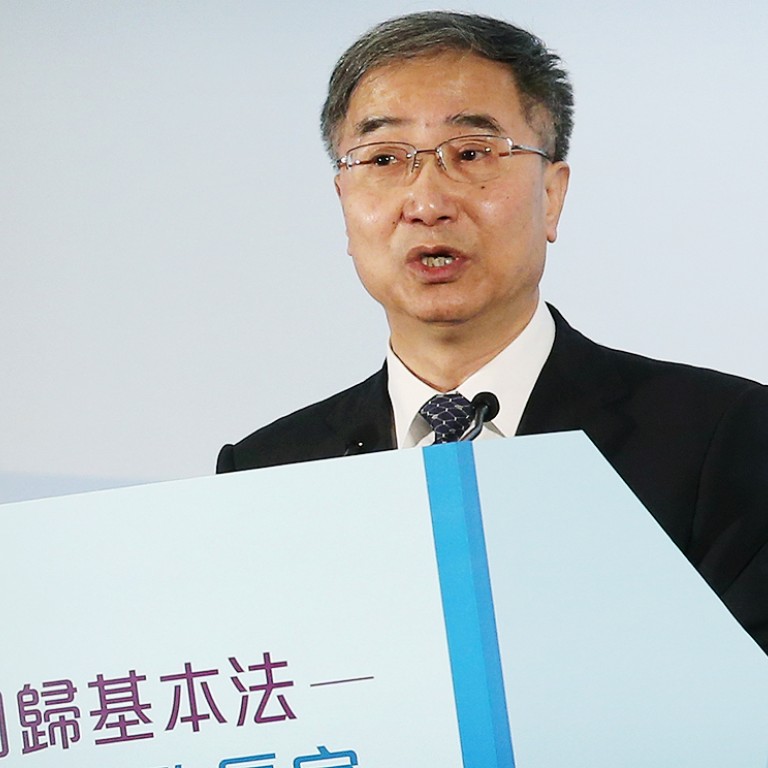
Chinese scholars praise NPC ruling... Hong Kong academics disagree
While legal scholars in Beijing may argue that the framework laid down for Hong Kong's constitutional future is reasonable, academics in Hong Kong feel otherwise, with one calling it a "very bad decision".
While legal scholars in Beijing may argue that the framework laid down for Hong Kong's constitutional future is reasonable, academics in Hong Kong feel otherwise, with one calling it a "very bad decision".
In Beijing, a former official in charge of Hong Kong affairs, Chen Zuoer, and four legal academics strove to explain to reporters why a nominating committee with only 1,200 members was a good idea.
Candidates needed to get the support of more than half the members because Hong Kong was a diversified society, said Jiang Shigong, deputy director of Peking University's Centre for Hong Kong and Macau Studies.
"The chief executive has to coordinate different sectors and different political interests of Hong Kong society … He also has to coordinate the relationship between Hong Kong and the central government, and has to accommodate differences while seeking consensus."
READ MORE: Bitter divide over Beijing's blueprint for Hong Kong's electoral reform
The specification of up to three candidates was to ensure that the election was "competitive" enough, Jiang said, adding that the winner might only get about 10 per cent of the vote if there were five or six candidates.
Rao Geping, a Basic Law Committee member and a professor at the same university, said rejecting the National People's Congress Standing Committee decision would seriously hinder Hong Kong's path to democracy.
"I hope the pro-democracy camp in Hong Kong can realise that the decision by the NPCSC is the basis for universal suffrage in Hong Kong, and anything that deviates from the decision will not lead to universal suffrage and consensus on that," he said.
Rao added that the NPC decision left some room for the local government to work out details, including the different weights given to the four sectors which will form the nominating committee, the composition of the subsectors, whether the sectors could represent more people, and whether members could be elected more democratically.
The mainland and legal experts said the electoral method could be adjusted after 2017, but any improvements would still need to go through the existing procedures.
Professor Johannes Chan Man-mun, former law dean at the University of Hong Kong, said the 2017 model was a "very bad decision for Hong Kong".
The 50 per cent threshold would exclude any pan-democrats from taking part in the election and was even worse than the model for the last election in 2012, when Democrat Albert Ho Chun-yan was able to run, he said.
"Candidates will have to fight tooth and nail for a nomination, and obviously the strategy is to rule out others as far as possible [in order to get 50 per cent support]." He said there would be "intensive lobbying" which could easily lead to corrupt practices.
Beijing's insistence on a 50 per cent nominating threshold reflected its determination to block any "risks" of a confrontational candidate being elected, said Chan's colleague, Professor Albert Chen Hung-yee.
Chen, who is a member of the Basic Law Committee, said the NPC was likely to adopt the current model if the new one was not passed by Legco.
Another colleague, Professor Michael Davis, said the decision left no room for pan-democrats. "The language in the decision is so strict I don't see any wiggle room left for pan-democrats. I doubt Hong Kong officials will make the nominating committee very broadly representative."
The Hong Kong take on the Beijing ruling on political reform
“Public nomination is absolutely necessary for the 2017 Hong Kong chief executive election … I totally support the idea of Occupy Central, but I will not take part in it because I cannot accept the idea of civil disobedience.”
“I do not support the Occupy Central act. I can accept the election does not include civil nomination because I think time is needed to draft and improve such a revolutionary idea, but we must be able to nominate the chief executive in the 2022 election. Otherwise the already existing chaos in Hong Kong will worsen, and there will be much more noise.”
Mr. Lee
50s
“Of course I want to see universal suffrage and public nomination in the election of our chief executive. But as for Occupy Central, I think it is really a problematic failure of Hong Kong citizens when many of them stay silent while their children are out there fighting hard for democracy.”
“You live here, you pay taxes, then you should have the ability to vote … You have to pick your battles. There is good protesting and there is ineffective protesting, and ultimately you are impacting a lot of people if you do a lockout like that, and as a result you can generate some bad press as opposed to good press.”
“It is highly unlikely that the NPC’s decision will satisfy our wishes. I think that Occupy Central is one of the very few means Hong Kong people have for expressing their views and fighting for true universal suffrage that includes civil nomination. And it is crucial for Hong Kong, an international hub, to politically meet the international standards of democracy.”
“I believe in democracy and I think public nomination is a crucial part of it … Democracy is so important that it is worth fighting for even though it means paralysing the central business district of Hong Kong.”








